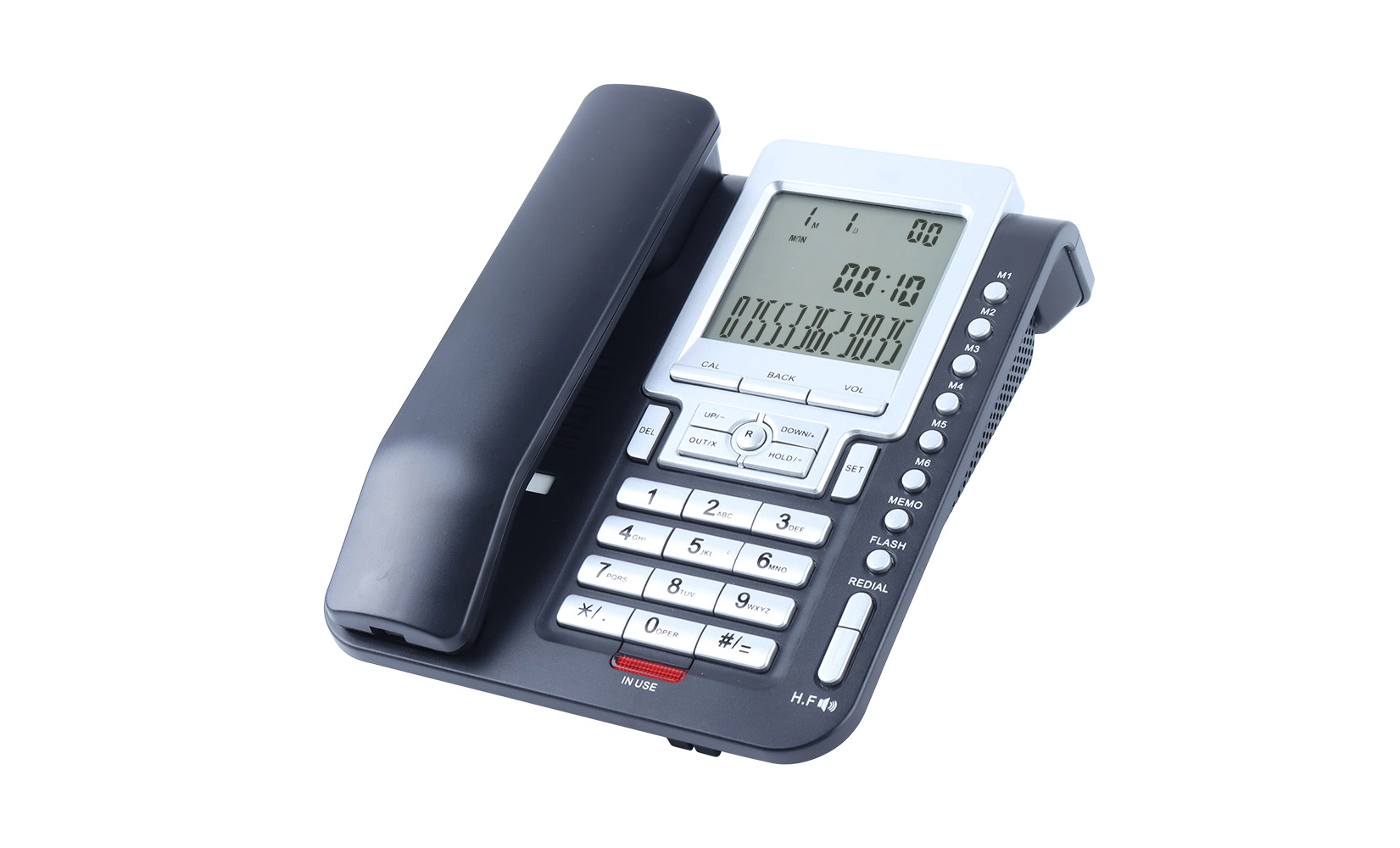Introducing the Fundamentals of Basic Business Telephones
Basic business telephones, often referred to as analog or traditional phone systems, have been the backbone of corporate communication for decades. These devices utilize copper wire connections to transmit voice signals, providing a straightforward and familiar method of making and receiving calls. Despite the rise of digital alternatives, many businesses continue to rely on these systems for their day-to-day operations.
Key Features of Basic Business Telephones
While basic in nature, these telephones offer essential functionalities that cater to business needs. Standard features typically include:
- Call holding and transferring
- Conference calling capabilities
- Voicemail systems
- Speed dialing
- Caller ID display
These features, while not as advanced as those found in VoIP or digital systems, provide the necessary tools for effective communication in many business environments. The simplicity of these systems often translates to reliability and ease of use, particularly for employees who may be less technologically inclined.
The Technology Behind Basic Business Telephones
The technology powering basic business telephones has remained largely unchanged for years, which contributes to its stability and widespread understanding. These systems operate on the Public Switched Telephone Network (PSTN), utilizing analog signals to transmit voice data. This tried-and-true technology ensures consistent call quality and reliability, even in areas where internet connectivity may be inconsistent or unavailable.
However, it's important to note that as technology progresses, support for analog systems may diminish over time. Businesses considering basic telephone systems should factor in the potential for future upgrades or transitions to more modern communication solutions.
Advantages of Implementing Basic Business Telephones
Basic business telephones offer several compelling advantages that continue to make them a viable option for many organizations. Understanding these benefits is crucial when evaluating communication solutions for your company.
Cost-Effectiveness and Affordability
One of the primary advantages of basic business telephones is their cost-effectiveness. The initial investment for these systems is often lower compared to more advanced digital or VoIP alternatives. This makes them particularly attractive for small businesses or startups operating on tight budgets. Additionally, the ongoing maintenance costs are generally lower, as these systems require less complex infrastructure and fewer software updates.
Reliability and Consistent Call Quality
Basic business telephones are renowned for their reliability. The analog technology they employ has been refined over decades, resulting in robust systems that rarely experience downtime. This reliability extends to call quality as well. Unlike internet-based phone systems, which can be affected by network congestion or connectivity issues, analog phones provide consistent audio quality. This reliability is crucial for businesses where clear communication is paramount.
Ease of Use and Minimal Training Requirements
The simplicity of basic business telephones is a significant advantage, particularly for organizations with a diverse workforce. These systems are intuitive and familiar to most employees, requiring minimal training for effective use. This ease of use can lead to increased productivity, as staff members can quickly adapt to the system without a steep learning curve. For businesses with high employee turnover or those employing temporary staff, this simplicity can be especially beneficial.
Independence from Internet Connectivity
Unlike VoIP systems, basic business telephones operate independently of internet connectivity. This independence ensures that communication lines remain open even during internet outages or in areas with unreliable broadband access. For businesses located in regions with inconsistent internet service or those requiring uninterrupted communication capabilities, this feature can be invaluable.
 Limitations and Considerations of Basic Business Telephones
Limitations and Considerations of Basic Business Telephones
While basic business telephones offer several advantages, they also come with limitations that businesses must consider. Understanding these drawbacks is essential for making an informed decision about your communication infrastructure.
Limited Advanced Features
One of the primary limitations of basic business telephones is their lack of advanced features. Unlike modern digital or VoIP systems, basic phones typically don't offer capabilities such as:
- Video conferencing
- Integration with customer relationship management (CRM) software
- Advanced call routing and analytics
- Mobile app integration for remote work
For businesses that require these advanced functionalities, basic telephone systems may prove inadequate. It's crucial to assess your company's communication needs and future growth plans to determine if the limited feature set of basic phones will suffice.
Scalability Challenges
Scaling a basic business telephone system can be more challenging and costly compared to digital alternatives. As your business grows, you may need to add new lines or expand your system's capacity. This often involves physical installation of new lines and hardware, which can be time-consuming and disruptive to your operations. Additionally, there may be limitations on the number of lines or extensions that can be added to a single system, potentially necessitating a complete overhaul as your business expands.
Integration Limitations with Modern Business Tools
In today's digital-first business environment, integration with other business tools and software is often crucial. Basic business telephones typically lack the ability to integrate seamlessly with modern business applications such as:
- Email systems
- Project management tools
- Cloud-based productivity suites
- Business intelligence platforms
This lack of integration can lead to inefficiencies and missed opportunities for streamlining communication and data management processes. Businesses that rely heavily on integrated digital tools may find basic telephone systems limiting in this regard.
Long-term Cost Implications
While basic business telephones often have lower upfront costs, it's important to consider the long-term financial implications. As technology continues to evolve, maintaining and repairing older analog systems may become more expensive. Parts and expertise for these systems may become scarcer, potentially leading to higher maintenance costs over time. Additionally, the potential need for a complete system overhaul in the future to accommodate new technologies or business growth should be factored into the long-term cost analysis.
Conclusion
Basic business telephones present a mixed bag of benefits and limitations for modern enterprises. Their reliability, ease of use, and cost-effectiveness make them an attractive option for many organizations, particularly small businesses or those with straightforward communication needs. The independence from internet connectivity and consistent call quality are significant advantages in certain operational contexts.
However, the limitations in advanced features, scalability challenges, and integration constraints with modern business tools cannot be overlooked. As businesses increasingly rely on digital integration and advanced communication capabilities, the simplicity of basic telephone systems may become a hindrance rather than an asset.
Ultimately, the decision to implement or maintain basic business telephones should be based on a careful assessment of your organization's current needs, future growth plans, and technological requirements. For some businesses, the reliability and simplicity of these systems will outweigh their limitations. For others, investing in more advanced communication solutions may be necessary to support their operational goals and stay competitive in an increasingly digital business landscape.
As with any significant business decision, it's advisable to consult with telecommunications experts and conduct a thorough cost-benefit analysis before making a final choice. By carefully weighing the pros and cons, you can ensure that your communication infrastructure aligns with your business objectives and supports your company's success in the long term.
FAQ
What are the main advantages of basic business telephones?
Basic business telephones offer reliability, consistent call quality, cost-effectiveness, and ease of use. They operate independently of internet connectivity, making them suitable for areas with unreliable broadband access.
What limitations should businesses consider when using basic telephones?
Limitations include a lack of advanced features like video conferencing and CRM integration, scalability challenges, and limited integration with modern business tools. Long-term cost implications should also be considered.
Are basic business telephones suitable for growing companies?
While suitable for small businesses, growing companies may find basic telephones limiting due to scalability challenges and lack of advanced features. It's important to assess future needs when making a decision.
Innovative Basic Business Telephone Solutions | CHEETA
At CHEETA, we specialize in crafting cutting-edge basic business telephone solutions that blend reliability with innovation. Our 18+ years of OEM/ODM expertise allows us to produce high-quality analog units that meet CE and ROHS standards. With a daily production capacity of 1,000 units and a failure rate below 1%, we ensure fast delivery and long-term reliability.
Our team of senior engineers continuously refines features based on global user data, enabling rapid upgrades to meet evolving customer needs. For businesses seeking dependable communication solutions, CHEETA offers customizable, state-of-the-art basic business telephones. Contact us at allen@cheeta.com.cn to explore how our telephone manufacturing prowess can elevate your business communication.

References
1. Smith, J. (2022). "The Evolution of Business Communication: From Analog to Digital". Telecommunications Review, 45(3), 112-128.
2. Johnson, A. & Brown, M. (2021). "Cost-Benefit Analysis of Traditional vs. VoIP Phone Systems in Small Businesses". Journal of Business Technology, 18(2), 75-92.
3. Thompson, R. (2023). "Reliability and Quality in Business Telephony: A Comparative Study". International Journal of Communication Systems, 36(4), 502-518.
4. White, S. et al. (2022). "Integration Challenges: Bridging Legacy Phone Systems with Modern Business Tools". Business Communication Quarterly, 85(1), 33-49.
5. Lee, H. & Garcia, P. (2023). "Scalability and Future-Proofing in Business Communication Infrastructure". Technology in Business, 29(3), 215-230.
 Basic business telephones
Basic business telephones




